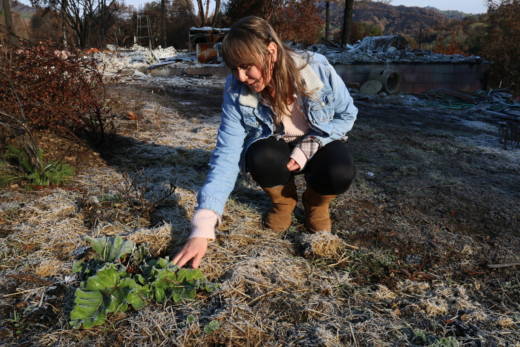"There is growing evidence that these wildfires may become more destructive in future years and we must adapt," PG&E CEO Geisha Williams told investors on a recent phone call. "It's important to have policies in place to provide a sustainable financial future for the state's energy companies."
Williams' remarks are part of a larger offensive the company launched in recent months to argue that drought and climate change have created a "new normal" in California and that state law needs to change to reflect that reality.
Williams and other executives argue the conversation isn't just about last year's fires, but the long-term survival of investor-owned utility companies. They warn that as climate change makes disasters more extreme, state law must adapt, too -- or PG&E could face bankruptcy.
Critics call this a cynical ploy to shift costs away from PG&E's Wall Street shareholders and to ratepayers, insurance companies and survivors of disasters like last year's blazes -- even when the utility's own negligence caused the damage.
Historically, state regulators have forced utilities to pay for damage caused by negligence out of their profits -- not by passing on those costs to ratepayers. That happened last year in a Southern California case. And it occurred after the 2010 San Bruno explosion, when a PG&E natural gas pipeline exploded, killing eight people.
"If the utility company is responsible through negligence, through failing to obey the law -- if they cut corners on safety and didn't do what we already paid them to do, then it's the PG&E stock owners who are responsible for paying, not people struggling to make ends meet and paying their monthly bills," said Mark Toney, executive director of the consumer advocacy group TURN.
TURN has been working against legislation, SB 1088, that they and other critics say would let PG&E shareholders off the hook when the utility’s negligence causes damage -- and leave ratepayers with the bill.
"What that bill would do is require PG&E to submit a safety plan -- let's say to cut down 10,000 trees," Toney said. "And as long as they cut down 10,000 trees, then even if there was negligence -- they would be off the hook. You and I would have to pay even when PG&E is negligent."
But SB 1088's author, state Sen. Bill Dodd, D-Napa, defends his bill. He represents areas that suffered catastrophic losses in the fires and says the bill is simply an effort to prevent future disasters by making sure that both utilities and state regulators are being proactive about safety.
“We need to have somebody looking out for us to make sure that number one, they do what they say they do, and if they don't that there are fines -- big, big fines," Dodd said.
But, Dodd said, if utilities do follow the safety plans, "then they can use the fact that their plan was deemed complete in their rate-making process."
PG&E supports SB 1088, which was written by labor unions associated with the utility. But PG&E lobbyists and executives have also been arguing for an even bigger change to a state law known as “inverse condemnation.”
That legal principle essentially says that since investor-owned utilities like PG&E get access to public and private property for their equipment, if that equipment causes property damage, PG&E has to pay for it -- even when they haven't done anything negligent.
PG&E executives believe that if they cannot pass those costs on to ratepayers, the company's long-term financial future is in doubt -- especially if climate change continues to make wildfires and other disasters more and more destructive.
"This means that if the utility's equipment is found to have been a substantial cause of the damage in an event like a wildfire -- even if the utility has followed established inspection and safety rules -- the utility may be liable for property damages and attorneys fees associated with that event," PG&E's Williams said during the recent call. "So in essence this is a strict liability approach that presumes a commensurate cost recovery for investor-owned utilities. That just isn't true. We strongly believe this is not the right approach for our customers or our shareholders."
Attorney John Fiske is representing many of the cities and counties suing PG&E over the North Bay fires. He sees PG&E's efforts to change inverse condemnation as a cynical ploy and noted that the utility was convicted of multiple felonies in the San Bruno explosion.
"What's interesting about this case is that, despite the storied history of PG&E as a felon, as being convicted of criminal negligence, as having fines imposed against it... in spite of all of that, PG&E's response in the Capitol is to take away the constitutional property rights of the very fire victims who have lost everything," he said. "There is a disconnect caused by hubris."
So far, no one has introduced legislation to change inverse condemnation, although Gov. Jerry Brown does seem open to the idea. Critics like Fiske are concerned that Brown and lawmakers could try to tackle the issue at the end of the legislative session in August.

